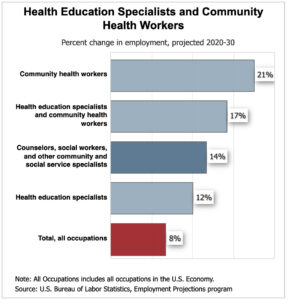While early workplace wellness programs were born out of a desire to control rapidly rising healthcare costs through preventive healthcare measures, the motivation for employers has evolved to include a wider range of concerns related to employee well-being.
The COVID-19 pandemic, along with a tight labor market, has elevated the importance of the wellness professional and an employer’s responsibility to their employees. Workplace well-being has expanded to address current issues, such as the transition from in-person to fully remote and hybrid work models, a greater need to offer competitive benefits to attract and retain top talent, and changing expectations—both within the new workplace and beyond—toward achieving a more optimal work-life integration.
Opportunities for the wellness professional offer a range of positions, including consultants, talent development professionals, medical practitioners, public health administrators, well-being practitioners, and worksite wellness administrators.
Mike Olson, co-founder of Advantage Health Corporation and UW Health and Wellness Management Advisory Board member, attributes the increased value of wellness professionals to a shift in organizational priorities: “Today, smart companies know that to retain talent, they need to provide a positive, engaging lifestyle.”
Health and Wellness Career Outlook
 According to the U.S. Bureau of Labor Statistics, employment of health education specialists and community health workers are projected to grow 17 percent from 2020 to 2030, much faster than the average for all occupations due to “an emphasis on promoting healthy behaviors, particularly based on experiences from the COVID-19 pandemic.”
According to the U.S. Bureau of Labor Statistics, employment of health education specialists and community health workers are projected to grow 17 percent from 2020 to 2030, much faster than the average for all occupations due to “an emphasis on promoting healthy behaviors, particularly based on experiences from the COVID-19 pandemic.”
Thirty-five percent of employers surveyed for Wellable’s 2022 Employee Wellness Industry Trends Report expect to invest more in health and well-being programs. As more companies recognize their role in supporting employees across all dimensions of health, including physical, mental, and emotional, demand for professionals who have the essential skills to manage these programs will grow. Likewise, reasons for offering workplace well-being programs have gone beyond healthcare cost savings and incentive campaigns to investment in mental health resources, stress management, and virtual wellness services.
Health and Wellness Jobs and Salaries
According to the 2022 U.S. Wellness Professional Compensation Report, published by Wellable and the National Wellness Institute, median average compensation for all wellness professionals ranges from $56,000 to $80,500. Work experience impacts salaries, with those having a decade or more of experience reporting median average salaries between $50,000 to $99,000. Additionally, the top 25 percent highest earning wellness professionals with a decade or more of experience reported salaries ranging from $100,000 up to and above $200,000 per year. Location also impacts salaries, with those working along the east and west coasts receiving higher salaries than their colleagues in the central U.S.
Job titles and salary ranges in this field vary. Some examples:
- Benefits coordinator ($36,871-$55,872)
- Corporate wellness administrator ($46,989-$82,368)
- Wellness program consultant ($49,917-73,052)
- Wellness program manager ($64,713-$118,212)
- Employee health services manager ($93,128-$145,839)
- Community health director ($90,509-$194,902)
Source: Salary.com’s 2020 salary calculator
Learn more about our 100% online degree and certificate programs.![]()
Get Program Guide
Health and Wellness Management Skills for an Evolving Field
The wellness professional has experienced changing roles and responsibilities since the emergence of workplace wellness programs. Most importantly, employers have embraced an expanded array of health concerns to address through their well-being initiatives.
To be effective in today’s workplace, the wellness professional needs knowledge, skills, and abilities in the following areas:
- An understanding of U.S. healthcare systems, including public health, insurance, and healthcare providers
- Communication strategies that connect with employees and senior leadership
- Ability to implement a legally compliant wellness strategy
- Inclusive and accessible approach to wellness program design that reaches a diverse workforce
- Self-awareness and understanding of the limits of their own knowledge, and the ability to refer individuals to other professionals when needed
- Facility with digital wellness technology to engage with a remote and hybrid workforce
RELATED: What is Health and Wellness Management?
“One of our core values here at Children’s Wisconsin is collaboration. In my role, there are other team members that I tap to help me with my work. From a collaboration perspective, being able to understand how diversity in perspectives and backgrounds help you create a wellness program that is inclusive to all is an important skill to have and sharpen.” —Eric Ziarek, Wellness Program Manager at Children’s Wisconsin, and UW Health and Wellness Management Advisory Board member
What is Health Coaching?
While the majority of wellness professionals focus on large-scale program planning, some roles may incorporate health coaching. Supplementing your wellness program management skills with a knowledge of health coaching practices can be beneficial depending on your career goals.
According to the National Board for Health and Wellness Coaching, health and wellness coaches “partner with clients seeking to enhance their well-being through self-directed, lasting changes, aligned with their values.” The National Society of Health Coaches describes health coaching as “the use of evidence-based skillful conversation, clinical strategies and interventions to actively and safely engage clients in health behavior change to better self-manage their health, health risk, and acute and chronic conditions resulting in optimal wellness, lowered health risk, improved health outcomes and decreased health costs.”
Because wellness program management often doesn’t allow the time or capacity to focus on one-on-one relationships, as well as program implementation, employers may split the roles into two separate areas of focus. Expanding your wellness skills to include knowledge of health coaching practices can give you a competitive edge in your career, increase opportunities, and enhance your abilities as a wellness professional.
What’s Next?
Do you want to learn more about UW Health and Wellness Management? In the 100% online Master of Science in Health and Wellness Management you’ll learn health and wellness perspectives, in addition to the strategic planning and communication skills you’ll need to manage well-being programs that have the power to transform the workplace and beyond. The flexible, online format is an optimal choice for adult students balancing work and family responsibilities, and offers easy access to academic advising and student support services.
For more information, contact a helpful enrollment adviser at 1-877-895-3276 or learn@uwex.wisconsin.edu.










